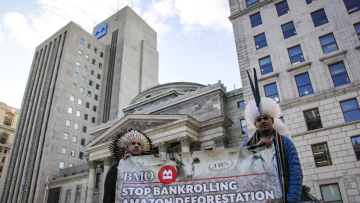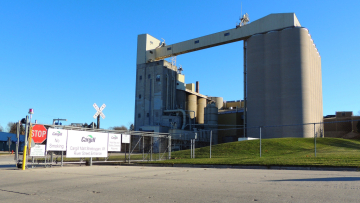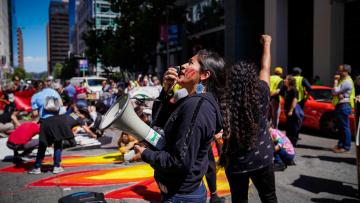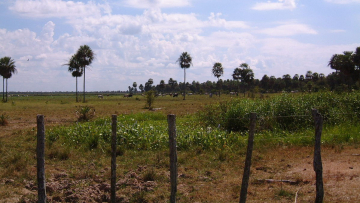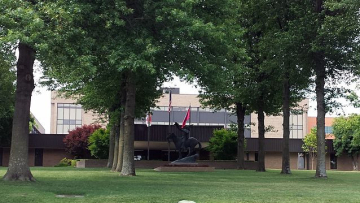UK banks providing billions in financing to big livestock corporations responsible for higher greenhouse gas emissions than UK and Ireland
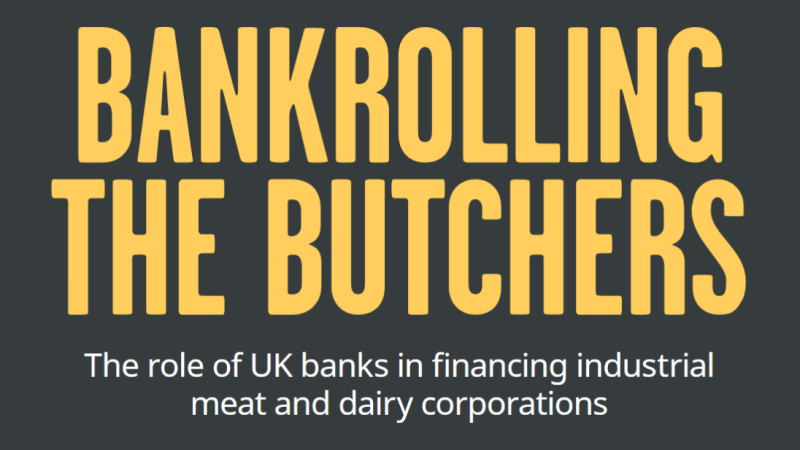
A new report released today by Feedback, ‘Bankrolling the Butchers’, reveals the scale of six UK banks’ financing of big livestock corporations – the world’s largest mass-producers and/or processors of meat, dairy and eggs at an unsustainable industrial scale.
At COP28, the FAO is expected to officially recommend that rich nations need to reduce their over-consumption of meat to meet Paris climate targets, as part of its global food systems’ road map to 1.5C (1) but Feedback’s findings show that finance is continuing to flow into meat production.
In total the UK’s ‘Big Six’ banks (Barclays, HSBC, Santander, Lloyds, NatWest and Standard Chartered) provided at least $77 billion (£62 billion) in financing to 55 of the world’s largest big livestock and animal feed companies between 2015-2022. These banks also owned nearly $1.2 billion (£1 billion) in shareholdings in these companies as of March 2023.
The largest UK financier of industrial livestock companies was Barclays, which provided $28.2 billion (£23 billion) in financing during this period, followed by HSBC, which provided $23.6 billion (£19 billion), and Santander, which provided $13.7 billion (£11 billion).
The ‘Big Six’ banks provided a total of $21.6 billion (£17 billion) in finance between 2015 and 2022 to five of the world’s biggest emitting big livestock companies – JBS, Marfrig, Cargill, Tyson Foods, and Minerva. These five companies combined cause an estimated 595 million tonnes CO2-equivalent in greenhouse gas emissions per year (2), more than the total emissions of the UK and Ireland (3). The ‘Big Six’ banks also held $143 million (£115 million) in shareholdings in these five companies.
Barclays and HSBC were the biggest financiers to US-based multinational Cargill, providing $4.9 billion (£4 billion) to the company. Cargill is one of the world’s largest big livestock and animal feed companies, responsible for an estimated 86.3 million tonnes CO2-equivalent in greenhouse gas emissions per year (4), more than the emissions of Norway. As the joint owner of Avara Foods, one of the largest suppliers of chicken and turkey to UK supermarkets and restaurants, Cargill bears significant responsibility for pollution in the Wye Valley, where intensive poultry farming by companies including Avara has wreaked devastation in recent years. The report finds that by financing Cargill, Barclays and HSBC are indirectly contributing to the ecological destruction of the River Wye. Cargill has also been linked to deforestation and land grabbing from Indigenous territories in the Amazon region (5).
The report also finds that between 2015-22, Barclays was the world’s largest financier to JBS – providing approximately US$2.75 billion (£2.2 billion) in corporate loans, US$450 million (£361 million) in revolving credit facilities and underwriting an estimated US$3.5 billion (£2.8 billion) in bond issuances for JBS and its subsidiaries. JBS is the world’s biggest meat corporation, whose activities are estimated to cause more greenhouse gas emissions than Spain (6) (7).
In light of these findings, Feedback is calling for the ‘Big 6’ banks to immediately stop new financing for big livestock and animal feed companies, on the basis of their large environmental and social impacts – and to divest all shares and bonds in these companies within the next five years.
Martin Bowman, senior policy and campaigns manager at Feedback, said: “Industrial livestock corporations are the food system’s biggest cause of emissions, deforestation, human rights abuses, pandemic risks and animal cruelty. They are hardwired to mass-produce unsustainable quantities of meat and dairy to preserve the profits of their core business – so defunding these companies is the only sustainable option for banks. The science is clear that we need to reduce global meat production to stay within safe environmental limits. We need policymakers to use every tool at their disposal to ensure a just transition to lower meat and dairy production and consumption, including regulation to cut off the financial fodder for this polluting industry.”
“Banks defend fuelling the fire of climate crisis by claiming they are engaging with polluters to improve practice – this is delusion, or greenwash, or both. In reality, polluters like Shell are defiantly ramping up fossil fuel production, whilst livestock corporations like JBS are openly planning for a 70% global increase in animal protein production by 2050 – both are a recipe for environmental disaster. UK bank environmental policies are worthless as long as they keep funding these destructive companies, which fiercely lobby against environmental policies and show no sign of being reformable.”
Kenneth Green, Campaigns Manager at Make My Money Matter said: “The world is facing a climate and nature emergency, and our banks are providing the cash that's fuelling this fire. Feedback’s alarming findings show the extent to which banks support the world’s largest livestock and animal feed companies; driving emissions, damaging nature and destroying lives and livelihoods around the world. All banks - especially those biggest financiers of agribusiness such as Barclays, HSBC and Santander - must take urgent action to understand and reduce the impacts of their investments on the planet. The clock is ticking.“
Further information:
Environmental impact of livestock industry Livestock is already responsible for about 16.5% of the total anthropogenic (human-caused) emissions globally (8). The global meat and dairy industry is projected to use up almost half of the world’s 1.5°C emissions budget by 2030 (9). Prof Hans Pörtner, scientist and co-chair of the UN Intergovernmental Panel on Climate Change (IPCC), has said: “Without reducing and cutting down on meat consumption and the associated high-intensity agriculture systems, we will not be able to keep global warming to 1.5 degrees” (10). Meat production quadrupled between 1961 and 2015 (11).
The production of animal protein and feed uses 83% of the world’s farmland, making it one of the biggest drivers of deforestation and biodiversity loss, despite providing only 37% of global protein and 18% of our calories (12). An estimated 48% of global tropical deforestation is caused by expanding pastures for cattle production and for soya production, primarily for animal feed (13). Nearly a quarter of current global pastureland was converted from formerly native forest (14).
Examples of financial institutions defunding industrial livestock Several large financial institutions already have policies of excluding big livestock companies – such as De Volksbank, the fourth largest banking group in the Netherlands which manages €37 billion in savings, which has a policy of avoiding investments in livestock farming because it involves problems in the areas of food security, climate change, biodiversity, health and human rights (15). Australian Ethical, which has US$5.4 billion in funds under management, has a policy of not investing in large-scale commercial animal agriculture (16).
Evidence that big livestock companies show no sign of being reformable A 2018 meta-study of over 40,000 farms revealed that even the very lowest impact meat and dairy products still almost always cause significantly more environmental harm than the highest impact vegetable and cereal products (17). Most incremental reforms to livestock practices like feed additives (18), soil carbon sequestration (19) and biogas production (20) only offer limited emissions reduction potential.
None of the big livestock companies covered in this briefing currently have plans to significantly reduce their meat production or processing – instead, many plan significant growth. For instance, in 2023 JBS said that it is planning for a 70% increase in global animal protein consumption by 2050 (21). A 2021 investigation by DeSmog found that the livestock industry has been spending millions lobbying against any transition to lower-meat diets which might limit their growth, and spreading misinformation downplaying the impacts of meat (22).
More info on Cargill and the River Wye In the UK, the River Wye is experiencing a biodiversity crisis primarily due to manure and other waste runoff from livestock farms in the area is seeping into the river and encouraging algal blooms (23). Avara Foods, which is part-owned by Cargill, owns 16 million out of the 20 million chickens in the Wye catchment area, and has faced calls to pay reparations to clean up the river (24).
Notes:
(1) Agnieska de Souza, 26 November 2023, Eat Less Meat Is Message for Rich World in Food’s First Net Zero Plan.
(2) IATP and Changing Markets Foundation, ‘Emissions Impossible: Methane Edition’ (The Institute for Agriculture and Trade Policy (IATP) and the Changing Markets Foundation, 15 November 2022), GRAIN and IATP, ‘Emissions Impossible: How Big Meat and Dairy Are Heating up the Planet’ (GRAIN and the Institute for Agriculture and Trade Policy, 2018). We have used GWP100 for these calculations. The figures for JBS, Tyson and Marfrig are 2021 figures from Emissions Impossible: Methane edition, whereas the figures for Cargill and Minerva are 2016 figures based on the original Emissions Impossible report, due to lack of available 2021 data for these companies – the emissions of Cargill and Minerva are likely to have increased since 2016, so our estimated total emissions are conservative.
(3) Hannah Ritchie, Max Roser, and Pablo Rosado, ‘Greenhouse Gas Emissions’, Our World in Data, 2022.
(4) GRAIN and IATP, ‘Emissions Impossible: How Big Meat and Dairy Are Heating up the Planet’, 22 Table 1.
(5) Mighty Earth, ‘Cargill: The Worst Company In the World’ (Washington DC, 2019).
(6) Ritchie and Roser (N.D.) Greenhouse Gas Emissions by Country.
(7) IATP and Changing Markets Foundation, ‘Emissions Impossible’.
(8) Twine, ‘Emissions from Animal Agriculture—16.5% Is the New Minimum Figure’.
(9) Harwatt, H. (2019) ‘Including animal to plant protein shifts in climate change mitigation policy: a proposed three-step strategy’, Climate Policy. Taylor & Francis, 19(5), pp. 533–541. doi: 10.1080/14693062.2018.1528965.
(10) Elena Sánchez Nicolás and Carolin Sprick, ‘Dismay over EU Plans to Keep Paying to Promote Meat’, EUobserver, 29 May 2022.
(11) IPES-Food, 2022. The politics of protein: examining claims about livestock, fish, ‘alternative proteins’ and sustainability.
(12) Poore, J. and Nemecek, T. (2018) ‘Reducing food’s environmental impacts through producers and consumers’, Science, 360(6392), pp. 987–992. doi: 10.1126/science.aaq0216.
(13) Florence Pendrill et al., ‘Deforestation Displaced: Trade in Forest-Risk Commodities and the Prospects for a Global Forest Transition’, Environmental Research Letters 14, no. 5 (May 2019): 055003.
(14) Matthew N. Hayek et al., ‘The Carbon Opportunity Cost of Animal-Sourced Food Production on Land’, Nature Sustainability 4, no. 1 (January 2021).
(15) Sustainability Expertise Centre, ‘GUIDE – SUSTAINABILITY CRITERIA’ (de Volksbank Sustainability Expertise Centre, May 2020).
(16) Australian Ethical, ‘Socially Responsible Investing - Our Positions’, Australian Ethical, 2021.
(17) J. Poore and T. Nemecek, ‘Reducing Food’s Environmental Impacts through Producers and Consumers’, Science 360, no. 6392 (June 2018): 987–92.
(18) Changing Markets et al., ‘High Steaks: How Focusing on Agriculture Can Ensure the EU Meets Its Methane Reduction Goals’ (Changing Markets et al, 2022).
(19) Tara Garnett et al., ‘Grazed and Confused? Food Climate Resarch Network Report.’ (Food Climate Research Network, 2017).
(20) Feedback, ‘Green Gas Without the Hot Air: Defining the True Role of Biogas in a Net Zero Future’ (London: Feedback, 2020).
(21) JBS, ‘2Q23 Institutional Presentation’, accessed 29 August 2023.
(22) Caroline Christen, ‘Investigation: How the Meat Industry Is Climate-Washing Its Polluting Business Model’, DeSmog (blog), 18 July 2021.
(23) Environmental Audit Committee, ‘Water Quality in Rivers’ (Environmental Audit Committee, 2022).
(24) Ibid.

